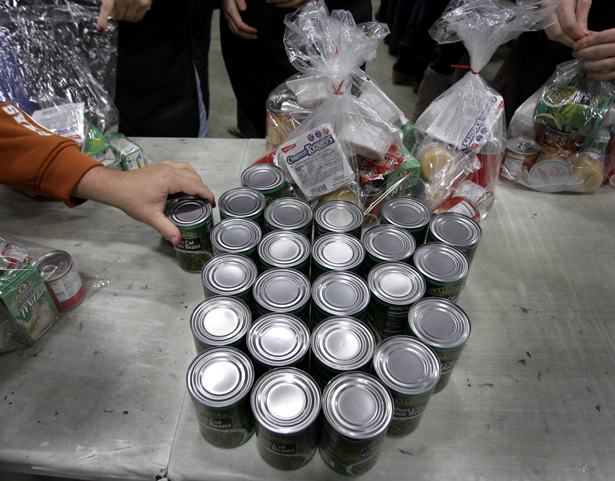
Volunteers fill bags at the Cleveland Foodbank. (AP Photo/Amy Sancetta)
A common talking point on left and right is that the Republican-engineered shutdown realizes a long-sought conservative goal: the wholesale shrinking of the federal government. But even during a shutdown, $250 billion—about four-fifths of what is normally spent—is automatically allocated every month. Social Security, Medicare, the military and national security are essentially insulated from shutdown shenanigans. For fiscal conservatives, at best the shutdown will nibble at the margins. So if this “crisis” isn’t really about reducing spending on big-ticket items, what is it about? It seems, increasingly, like subterfuge for curtailing safety net programs the GOP has long loathed.
In fact, it’s precisely because so many government functions do continue that the impact on programs that are not “entitlements” or otherwise seen as politically untouchable is particularly acute. Despite the disproportionate amount of media attention paid to shuttered national parks, the bulk of the pain has largely fallen on programs like Head Start, WIC, Meals on Wheels, drug treatment and mental health services, loans to low-income homebuyers, job training programs, workplace and environmental inspections, and so on.
That so many political figures can blithely say that a shutdown is no big deal speaks to a catastrophic failure in our institutions: increasingly, our political classes have become unresponsive to the needs of those lowest on the country’s economic ladder. That absence of empathy is one of the great scandals of our age.
As of press time, we don’t know how long the government shutdown will continue or whether it will segue into the even more gratuitous act of failing to raise the debt ceiling. But regardless of the outcome, we do know that the posturing has already caused huge disruptions and hardships for America’s most vulnerable. A few days in, Arizona suddenly stopped issuing TANF checks, and thousands of poor families were left not knowing when or if their benefits would arrive. The state subsequently reversed that decision, but by then those hand-to-mouth families had already endured wrenching delays. In North Carolina, women on WIC scheduled to get their benefits after October 8 were told that no new payments were being made—and no new applications for the state’s program were being accepted. Utah also stopped taking new applications, and about a half-dozen other states also curtailed their programs. Thousands of low-income kids are going without early education, as Head Start programs in several states go unfunded. In Florida, large programs shuttered their doors within days of the start of the shutdown.
In the nation’s capital, which has no state income, basic city services were at risk of shutting down days into the crisis, and millions of dollars a day in tax revenues were lost as federal employees stayed home and local businesses that rely on them struggled to stay afloat. Meanwhile, in California, anti-poverty advocates fretted that come October 15, the state will face the unpalatable choice of turning new applicants away from the food stamp program or having to risk its hard-earned fiscal stability by releasing hundreds of millions into a program that is supposed to be paid for by the feds. That’s particularly ironic given the progressive turn California’s politics have taken in recent months—from passage of the $10-an-hour minimum wage to Governor Brown’s recent decision to sign a bill allowing undocumented migrants to receive driver’s licenses.
Every day the shutdown goes on increases the number of people devastated by these cuts, and every day further entrenches the idea that the rollback of these programs is the new normal. Arizona’s experiment with ending TANF could ultimately serve as a template for a slew of other states to opt out of welfare. WIC programs, once suspended, might prove hard to rebuild. It’s much easier to destroy public infrastructure than to rebuild it.
The anti-government mob running the House Republican caucus knows this. For forty years, this crowd has sought to create such public hostility to the concept of taxation, the social safety net and regulation that Americans revolt against the very idea of government. Now this right-wing anarchism is getting its way. As basic services go undelivered, public confidence in Congress is all but nonexistent, and public rage at dysfunction in Washington is at an all-time high.
How contemptible is it to use hungry infants, destitute men and women, and dilapidated communities as political pawns? How warped is a set of priorities that says “no big deal” as the schoolyard bullies pummel the skinny kids? It’s one of the most cynical, vandalistic moves in modern US history. And, as usual, it’s the poorest who are getting hammered. Sasha Abramsky
George Zornick, Annie Shields and Steven Hsieh are live-blogging the debt ceiling deadline.


